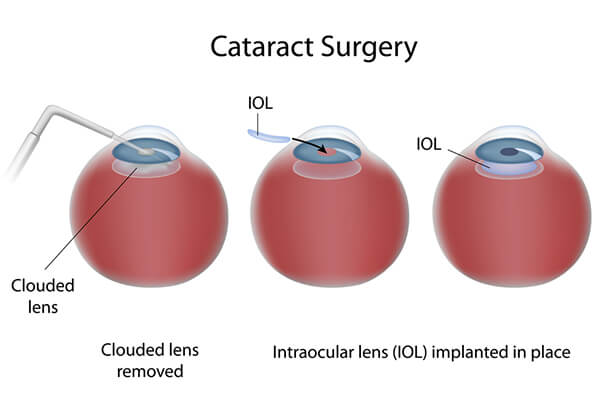CATARACTS
What are Cataracts?
Are you interested in learning about cataracts and their treatment options? A cataract occurs when the natural lens inside the eye becomes cloudy, which affects our ability to focus on objects at different distances. This cloudiness often develops as part of the normal aging process. If left untreated, cataracts can progress to the point of causing blindness, making them the leading cause of blindness worldwide. The term "cataract" comes from the word for "waterfall," as the distorted vision caused by cataracts can resemble the view through a waterfall. If you’re experiencing symptoms of cataracts or would like to consult with our eye doctors, please schedule an appointment at Alta Vista Eye Care.
Who Gets Cataracts?
Most people who develop cataracts are older than 60 years. Cataracts in older people are so common they can be regarded as a normal part of the aging process. Among the major conditions related to cataracts are diabetes or injury to the eye. Medications such as steroids can also cause cataract formation. In rare cases, congenital cataracts are present at birth.

What are the symptoms of Cataracts?
Typical symptoms include:
- Cloudy, fuzzy, foggy, or filmy vision.
- Changes in the perception of colors.
- Problems driving at night because headlights seem too bright.
- Problems with glare from lamps or the sun.
- Frequent changes in your eyeglass prescription.
- Double vision.
How do I decide to have Cataract surgery?
Most people have plenty of time to decide about cataract surgery. Your doctor cannot make the decision for you, but talking with your doctor can help you decide.
Tell your doctor how your cataract affects your vision and your life. Read the statements below, see which ones apply to you, and tell your doctor if:
I need to drive, but there is too much glare from the sun or headlights. I do not see well enough to do my best at work.
- I do not see well enough to do the things I need to do at home.
- I do not see well enough to do things I like to do (for example, read, watch TV, sew, hike, play cards, and go out with friends).
- I am afraid I will bump into something or fall.
- Because of my cataract, I am not as independent as I would like to be.
- I cannot see well enough with my glasses.
- My eyesight bothers me a lot.
You may also have other specific problems you want to discuss with your eye doctor. Our doctors will give you cataract surgery options.
How can Cataracts be treated?

The natural lens of the eye that has been damaged by a cataract is surgically removed and then replaced with a clear artificial lens. During cataract surgery, usually done on an outpatient basis, a tiny incision is made in the eye and the cataract-damaged natural lens is removed through the incision. An artificial lens is then inserted through the same incision. Most patients have significantly improved vision after cataract surgery procedures.
Can a Cataract return?
A cataract cannot return because the entire lens has been removed. However, in as many as half of all people who have extracapsular surgery or phacoemulsification, the lens capsule (the tissue bag that supports the replacement lens) becomes cloudy. This cloudiness can develop months or years after surgery. It can cause the same vision problems as the original cataract.
The treatment for this condition is a procedure called a YAG laser capsulotomy, which is named for the material used to generate the laser energy (yttrium-aluminum-garnet). The doctor uses a laser (light) beam to make a small opening in the capsule through which light can pass unimpeded. This surgery is painless and does not require a hospital stay. Most people see well after a YAG capsulotomy. Your doctor will discuss the risks with you.
What are the benefits of Cataract surgery?
Cataract surgery restores quality vision for millions of patients each year. Good vision is vital to an enjoyable lifestyle. Numerous research studies show that cataract surgery restores quality-of-life functions including reading, working, moving around, hobbies, safety, self-confidence, independence, daytime and nighttime driving, community and social activities, mental health, and overall life satisfaction.
What are the risks of Cataract surgery?
Cataract surgery is performed millions of times every year in the United States. In fact, it is the most commonly performed surgery in the U.S. About 98 percent of patients have a complication-free experience that results in improved vision. Nevertheless, cataract surgery has risks and complications. Most complications resolve in a matter of days to months. In rare cases, patients lose some degree of vision permanently as a result of the surgery.
Is it still necessary to wear thick glasses after Cataract surgery?
Cataract surgery restores quality vision for millions of patients each year. Good vision is vital to an enjoyable lifestyle. Numerous research studies show that cataract surgery restores quality-of-life functions including reading, working, moving around, hobbies, safety, self-confidence, independence, daytime and nighttime driving, community and social activities, mental health, and overall life satisfaction.
How successful is Cataract surgery?
Cataract surgery has an overall success rate of 98 percent.
Are lasers used to treat cataracts?
In general, no. In some cases, the bag-like capsule membrane that supports the artificial lens that replaces the damaged cataractous natural lens may become clouded several months after cataract surgery. In that case, a YAG laser may be used to make a clear opening in the lens-containing membrane.
What kind of doctor performs Cataract surgery?
Cataract specialists are medical doctors, known as ophthalmologists, who have completed medical school, an internship, and at least three additional years of specialized training in eye diseases and surgery. Only those ophthalmologists with specialized training in eye surgery are authorized to perform cataract surgery.
Catch on
Patient Portal
Stay connected to your care with our easy-to-use Patient Portal.
Find Our
EYE CARE CENTER
Visit our two state-of-the-art clinics in California, designed to best meet your needs.
Financial
ARRANGEMENT
Alta Vista Eye Care accepts a wide range of insurance plans and provides flexible patient financing options to assist with out-of-pocket expenses. Our dedicated financial counselors are here to guide you through the approval process, which takes just minutes!
What Our Clients Say
Trustindex verifies that the original source of the review is Google. I felt that the doctor was interested in me and was helpfulTrustindex verifies that the original source of the review is Google. Excellent service.Trustindex verifies that the original source of the review is Google. The staff and the doctor were the best.. very caring and knowledgeable. Excellent careTrustindex verifies that the original source of the review is Google. As always the service is perfect I love the staff and the doctor is awesomeTrustindex verifies that the original source of the review is Google. The doctors and staff at his office are exceptional in their field. After one trip to the emergency room, one trip to their office. Still feeling pain from what I believe before an object in my eye, they saw me at the end of their day. They all stayed late and a foreign object was removed from my eye.If you want, exceptional care, kindness, and highly educated doctors and staff. I would highly recommend this office to anybody looking for an ophthalmologist that is exceptional and an exceptional office staff I can’t thank them enough for the kindness and relief they’ve given meTrustindex verifies that the original source of the review is Google. Buen servicio muy buena atención y muy.buenos.especialista en la vista cataratas carnosidad glucomaTrustindex verifies that the original source of the review is Google. ExcellentTrustindex verifies that the original source of the review is Google. The Dr and his team members are very helpful and caring for their patients. I will recommend them to my friends and relatives. Thank you.
LOCATIONS
1901 Outlet Center Drive Suite 240
Oxnard, CA 93036
Tel 805-981-6300
1000 Newbury Road
Suite 230
Thousand Oaks, CA 91320
Tel 805-499-6800
